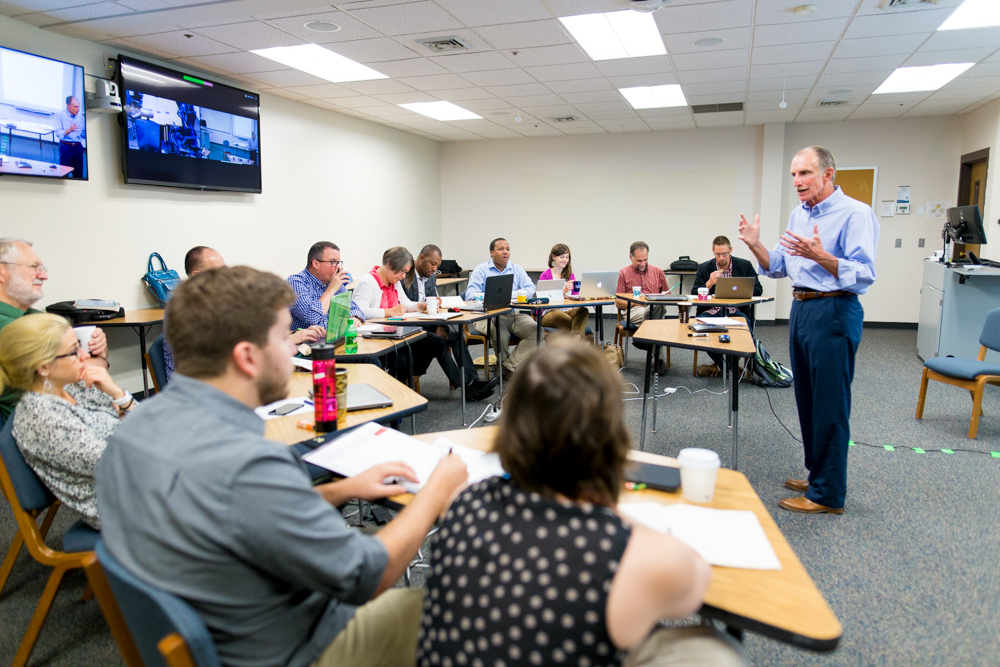Aubrey Bauman, marking manager and sustainability lead at AMERIgreen Energy, enrolled in the Collaborative MBA program for “the opportunity to learn with professors and classmates from across the country and the world.”
Her experience in an Aug. 8-12 residency at Eastern Mennonite University (EMU) didn’t disappoint. A dozen students from six states and three countries took part, embarking on two years of study.

The cohort, the third since the program began in 2014, is the most international to date, with a third of the students coming from Africa. For most of the program, the students will participate in live video conference classes, but they come together for a face-to-face session at the beginning of the studies, midway through for an experiential learning trip to Costa Rica, and a brief wrap-up at the end.
Ruben Dyck, pastor of youth in the Blumenau Mennonite Church in Chihuahua, Mexico, appreciates the vocational and cultural diversity of his classmates in this learning context, where he is especially interested in gaining knowledge related to “leadership, administration and the way that organizations work, and to be able to apply this in my context of church leadership,” he said. “I’m also looking forward to learning more about sustainability and leadership for the common good, and applying this as I walk with many of our Christian businessmen in the midst of the challenging questions they face.”
Students’ diverse professionals, cultures an asset
Students come from Nigeria, Kenya and Mexico, as well as from Indiana, Pennsylvania, Virginia, Michigan, Kansas and Minnesota.
David Brubaker, assistant professor of organizational studies and coordinator of EMU’s MBA program, says the variety of backgrounds in the Collaborative MBA program should be an asset.
“I think what has most impressed me about the cohort is the quality and diversity of the 12 participants,” Brubaker says. “From the previous two cohorts, we know that it’s possible to develop a genuine collaborative learning community through this very limited residency model.”

The program structure itself is also unique, with four participating schools—Bluffton (Ohio) University, Canadian Mennonite University (Winnipeg, Manitoba), EMU and Goshen (Indiana) College—and a foundation of Anabaptist ethics and values. The administration of the program and the residency weeks rotate among the schools.
Bluffton program head addresses complexities of leadership
George Lehman, holder of the Howard Raid Chair in Business and chair of the Division of Business Studies at Bluffton University, took over administrative responsibilities for the Collaborative MBA last month. Lehman says the program’s distinctive framework matters immensely.
“Leadership is better in a richly textured life where lots of things fit together,” Lehman says. “You can’t separate one from the other very much. We try to think carefully about context and what it means for our values and the common good and sustainability. We bring a set of values to the course content that I think is very important.”
The opening residency, for example, included a day of presentations from Mennonite Health Services president Rick Stiffney and discussion of books such as Robert Greenleaf’s “Servant Leadership” and Daniel Goleman’s “Emotional Intelligence.” Formal and informal opportunities for group-building were also provided.
Faith-based approach celebrated by guest lecturer

Stiffney, a consultant with more than 25 years of leadership experience in health and human services leadership (see his blog about leadership), says he was deeply honored to be part of the week.
“To be invited to visit with young and aspiring leaders is an invitation to be in sacred space,” Stiffney says. “This is a values-based, faith-infused approach to leadership development, and I believe in that. You can go to a lot of places and get secular executive training, but this asks how our leadership is aligned with creating the common good.”
Stiffney, who shared about his personal leadership journey as well as broader perspectives, emphasized the concept of personal formation: How are leaders shaped and how do they grow? He says the Collaborative MBA format suits that approach well.
“The idea of cohort-based adult learning—learning together—is a really important construct that builds real human relationships and encourages feedback,” Stiffney says. “It asks, ‘How do our perspectives enrich each other?’ ”
Students take nine core courses—with Bluffton, EMU and Goshen each providing three—and three electives that permit specialization in several concentrations.
The program graduated nine students in the first cohort in spring 2016. The 2017 cohort will hold its initial residency at Bluffton.
